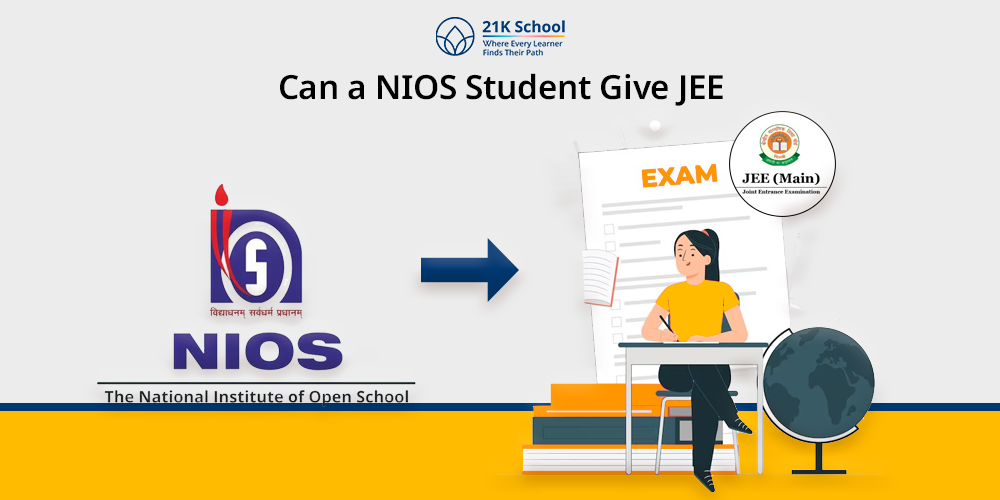
Are you confused, whether a NIOS student can appear for the JEE exam or not?
Yes, NIOS students can take the JEE examination, as NIOS is a government-recognised educational board that provides open education to every student.
Students who have passed through the NIOS board can easily apply for the JEE examination without any hindrances.
Joint Entrance Examination (JEE) is a national-level Entrance examination conducted for the admission of candidates to top engineering colleges, especially Indian Institutes of Technology (IITs).
JEE examination is conducted in two stages, that is, JEE Main and JEE Advanced. Students have to complete all the examinations with the required rankings in order to get admitted to IITs.
Along with the examination, students all need to appear for the Joint Seat Allocation Authority (JOSAA) counselling. Through the NIOS board, students can appear for the JEE examination and are eligible to be enrolled in IITs.
Table of Contents
- Here’s why NIOS Students are Eligible for JEE?
- Can NIOS Students Give JEE Advanced?
- Documents Required for JEE exam for NIOS Candidates
- Important Notes
- Examples of Students who have Succeeded from NIOS
- Eligibility Criteria of JEE Advanced with NIOS
- Subject Requirements for JEE Advanced with NIOS Board
- Tips for NIOS Students Appearing for JEE
- Conclusion
Here’s why NIOS Students are Eligible for JEE?
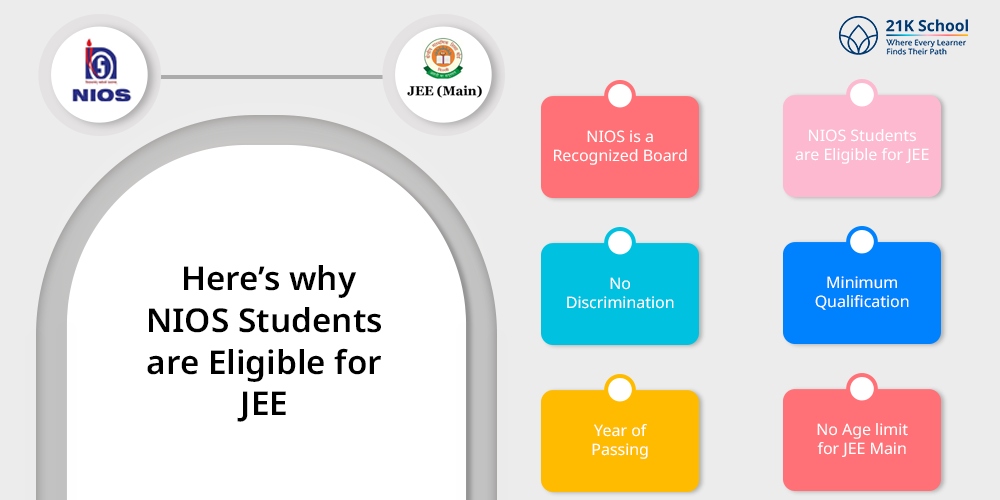
The NIOS board is a government-recognised board which gives approval for students to apply for JEE.
Through NIOS, students can study as distance education enables them to complete their education as per their convenience.
However, candidates need to meet all the essential requirements set by the exam authorities of JEE to become eligible for the exam.
1. NIOS is a Recognized Board
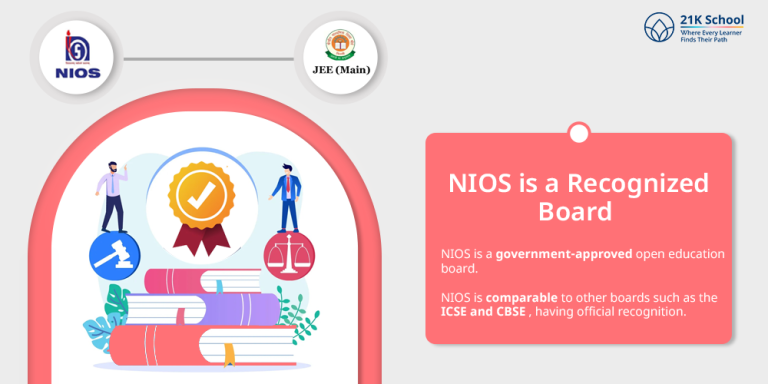
NIOS is a government-approved open education board. NIOS is comparable to other boards such as the ICSE and CBSE , having official recognition. This recognition has made it possible for NIOS students to apply for JEE and other entrance exams.
Through the NIOS board, students can appear for various national competitive examinations, which makes it compatible with higher education and career goals.
2. NIOS Students are Eligible for JEE
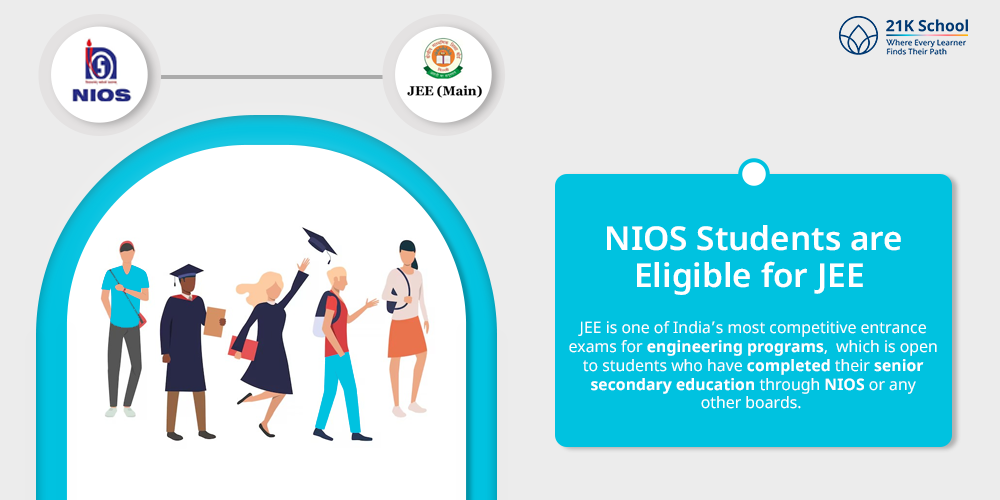
JEE is one of India’s most competitive entrance exams for engineering programs, which is open to students who have completed their senior secondary education through NIOS or any other boards.
JEE Advanced and JEE Main are the two stages of the JEE examination.
Students from NIOS can register for the JEE Main entrance exam for numerous engineering institutes such as the Indian Institutes of Technology (IIT) and National Institutes of Technology (NIT).
3. No Discrimination
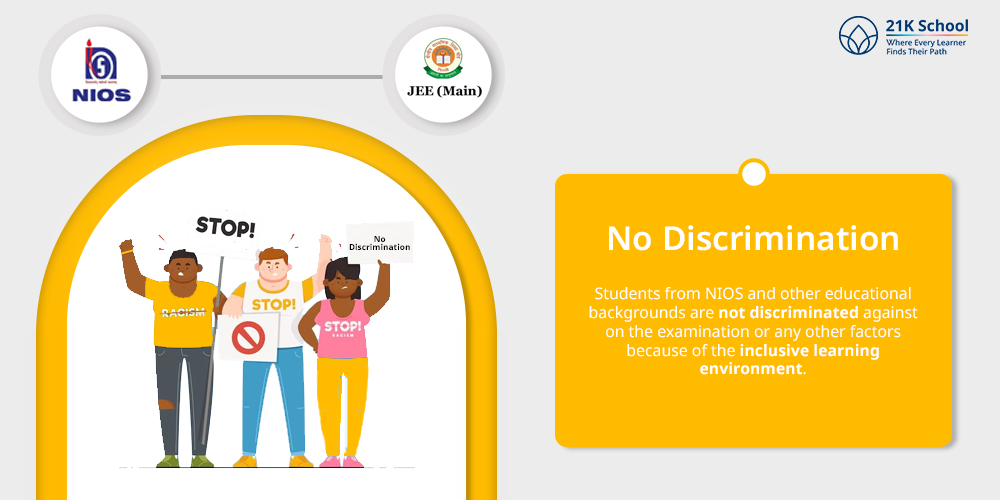
Students from NIOS and other educational backgrounds are not discriminated against on the examination or any other factors because of the inclusive learning environment.
A student’s academic standing and merit are given more weight by examiners than the kind of board they attended.
4. Minimum Qualification:
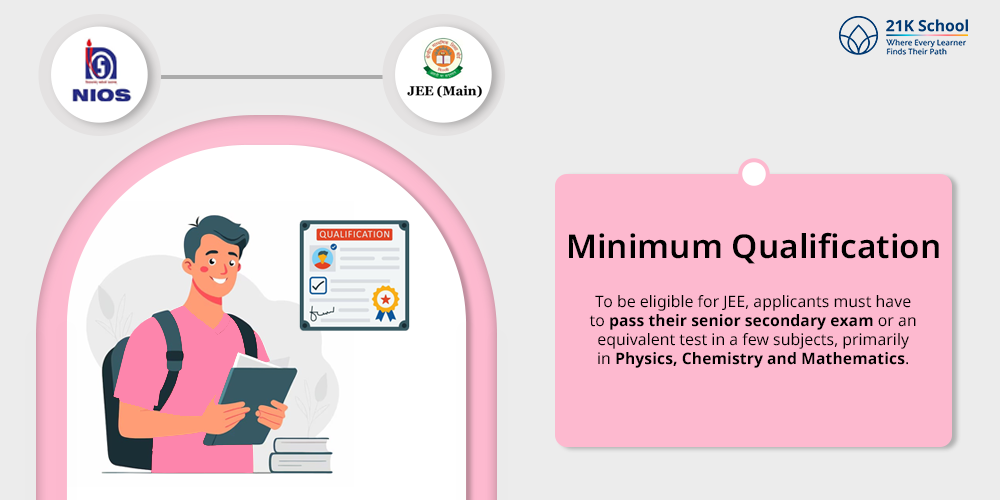
To be eligible for JEE, applicants must have to pass their senior secondary exam or an equivalent test in a few subjects, primarily in Physics, Chemistry and Mathematics.
The minimum percentage required to qualify for the general category is normally around 75% however, students in the reserved categories (SC, ST and OBC) may be exempt.
It is essential for children from NIOS board to ensure all eligibility of the JEE examination.
5. Year of Passing
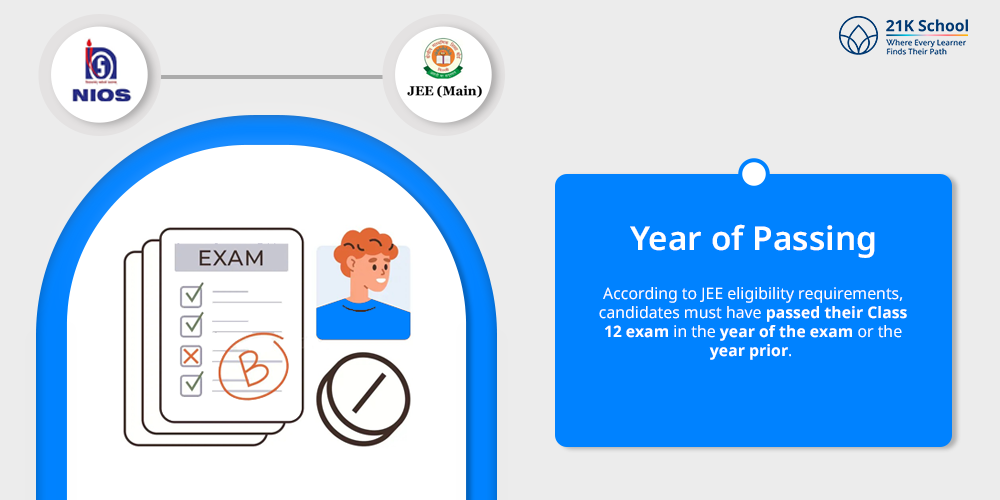
According to JEE eligibility requirements, candidates must have passed their Class 12 exam in the year of the exam or the year prior.
For instance, in order to be eligible for JEE Main in 2026, students must have completed their Class 12 in 2024 or 2025. This requirement ensures that candidates are recent graduates familiar with the most recent curriculum and testing practices.
6. No Age limit for JEE Main
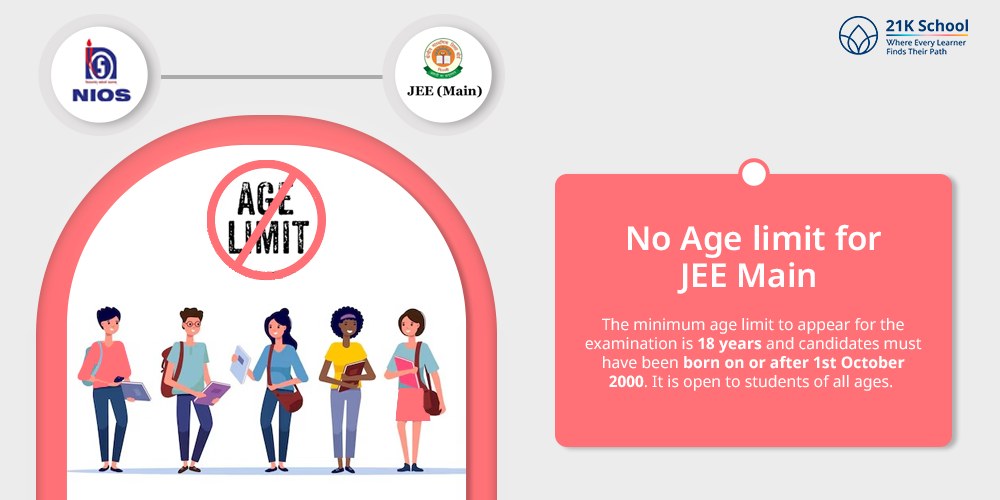
There is no upper age limit for candidates who want to take the JEE examination.
However, the minimum age limit to appear for the examination is 18 years and candidates must have been born on or after 1st October 2000. It is open to students of all ages.
This policy is especially advantageous for non-traditional students who may have taken a gap year.
Can NIOS Students Give JEE Advanced?
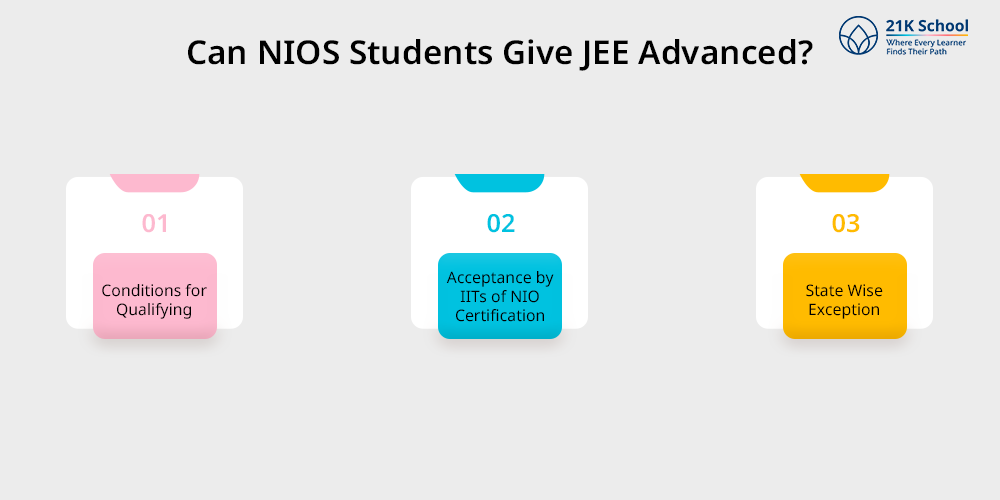
Yes, NIOS students are eligible to take the JEE Advanced exam provided they meet the requirements which include passing JEE Main and achieving the necessary percentage on their board exams.
To be eligible NIOS students must take the JEE Main exam first, if they pass they can then take the JEE Advanced exam.
After the JEE Advanced examination students have to appear for Joint Seat Allocation Authority (JoSAA) Counseling for respective IITs.
Students must have passed the Class 12 NIOS equivalent exam in subjects like Physics, Chemistry and Mathematics (PCM).
Passing the Class 12 exam the year before or the year before taking the JEE Advanced is essential for applicants.
1. Conditions for Qualifying
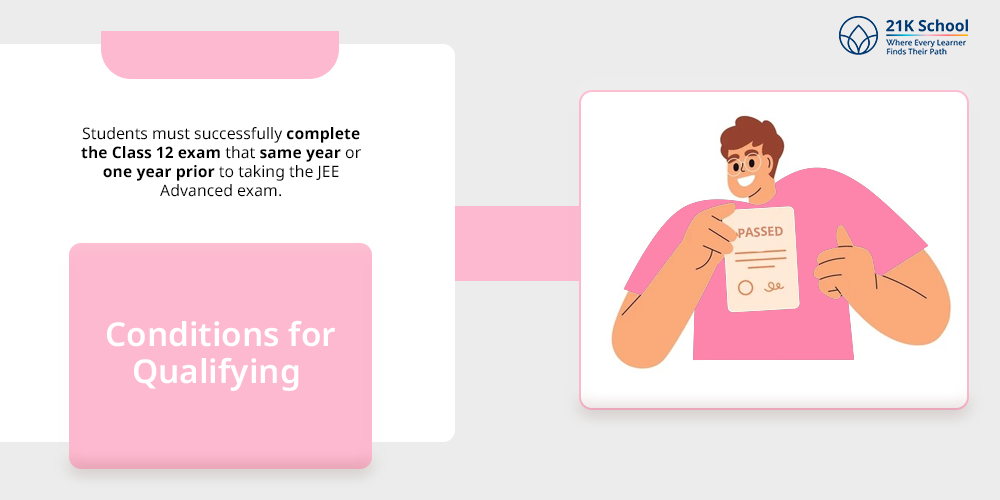
Students from NIOS board must pass the PCM subjects that are Physics, Chemistry, and Mathematics.
They are allowed to take the test twice in a year and share the same age and attempt limits as students from other boards.
Students must successfully complete the Class 12 exam that same year or one year prior to taking the JEE Advanced exam. Students should also ensure that they meet age requirements before applying for the JEE examination.
2. Acceptance by IITs of NIOS Certification
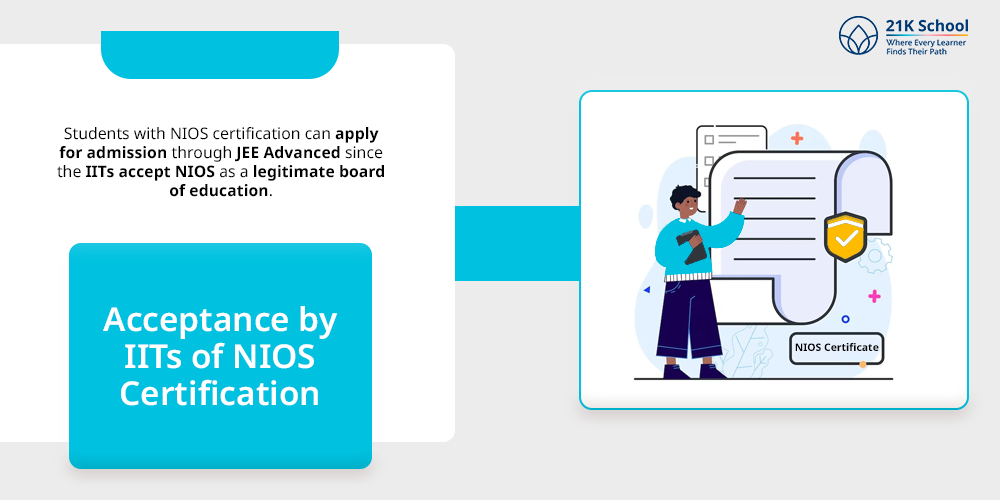
Students with NIOS certification can apply for admission through JEE Advanced since the IITs accept NIOS as a legitimate board of education.
NIOS board holds the same weight as CBSE or ICSE, which allows students to enroll in IIT.
Students have to submit all the certification required by the exam authorities such as secondary education certification, passing certificates etc. Students from NIOS board don’t have to submit any migration certificate.
3. State Wise Exception
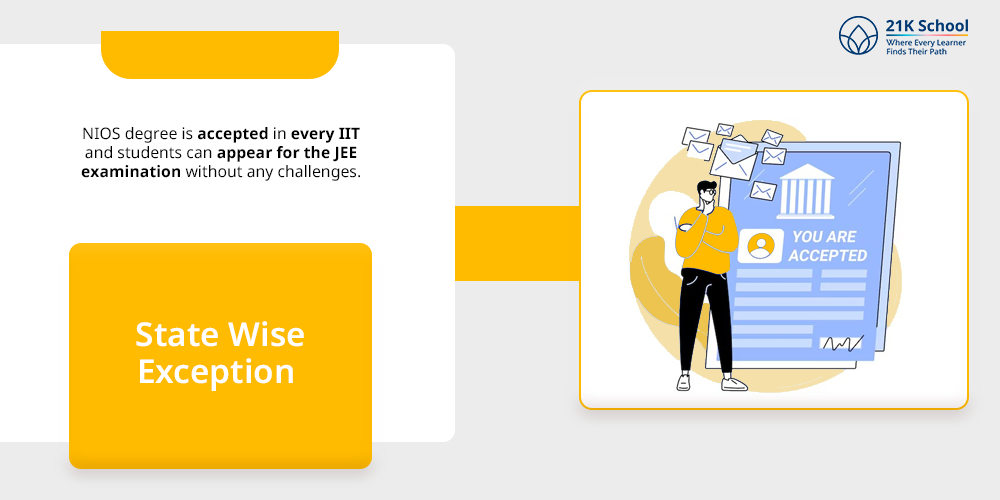
NIOS degree is accepted in every IIT and students can appear for the JEE examination without any challenges.
Students should review the admissions policies of the IITs in their states to ensure that any local laws or additional paperwork are followed.
Documents Required for JEE exam for NIOS Candidates
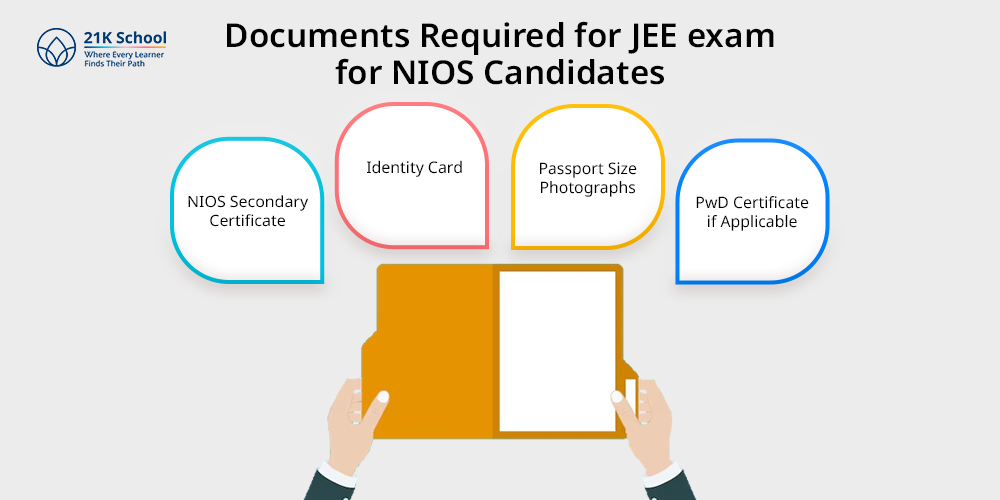
Students who are going to appear for the JEE examination need to submit some documents which are essential for enrollment.
Students who have passed through NIOS don’t have to submit any migration certificates. These documents ensure that the correct candidate is applying for the examination.
1. NIOS Secondary Certificate
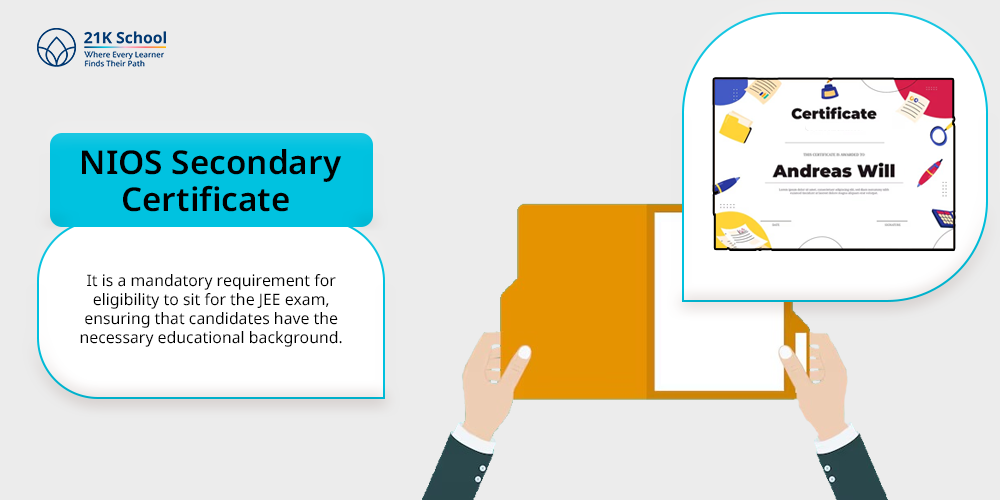
The NIOS secondary certificate is an essential document for applying for the JEE examination. This confirms that the candidate has successfully completed their secondary education through the NIOS board.
It is a mandatory requirement for eligibility to sit for the JEE exam, ensuring that candidates have the necessary educational background.
2. Identity Card
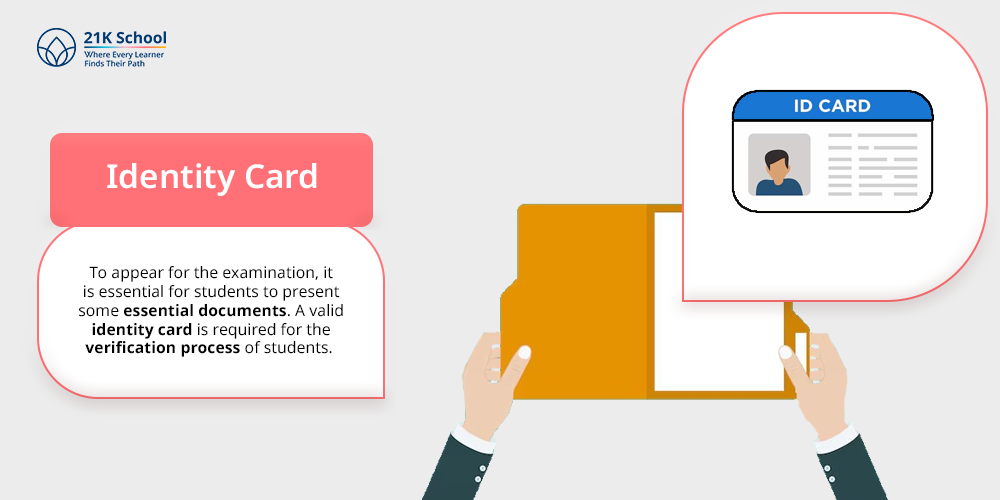
To appear for the examination, it is essential for students to present some essential documents. A valid identity card is required for the verification process of students.
Identification issued by the government, such as a voter ID, passport, Aadhar card or any other recognised form of identification, is acceptable. Through the identity card, the JEE examination can maintain the integrity of the examination process.
3. Passport Size Photographs
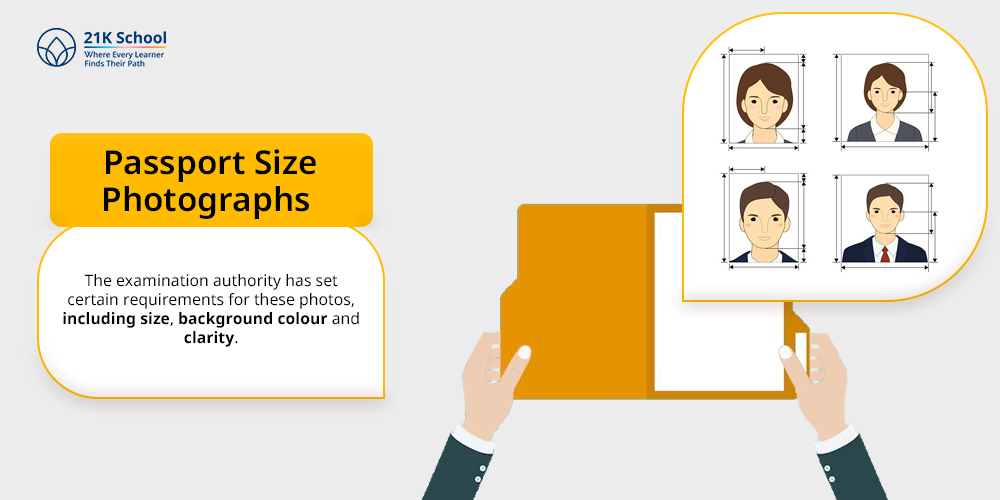
The application must include recent passport-sized photos. The examination authority has set certain requirements for these photos, including size, background colour and clarity.
Candidates need to present two passport-size photographs in a correct format to ensure a smooth process.
4. PwD Certificate if Applicable
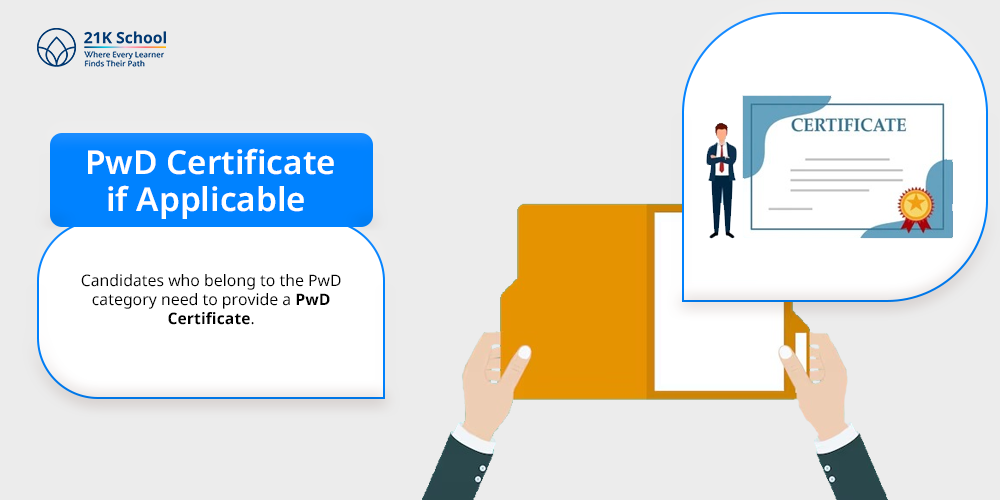
Candidates who belong to the PwD category need to provide a PwD Certificate.
To ensure that every candidate has an equal chance to perform to the best of their abilities, this document is crucial for gaining access to any special provisions or accommodations that might be available during the exam.
Important Notes
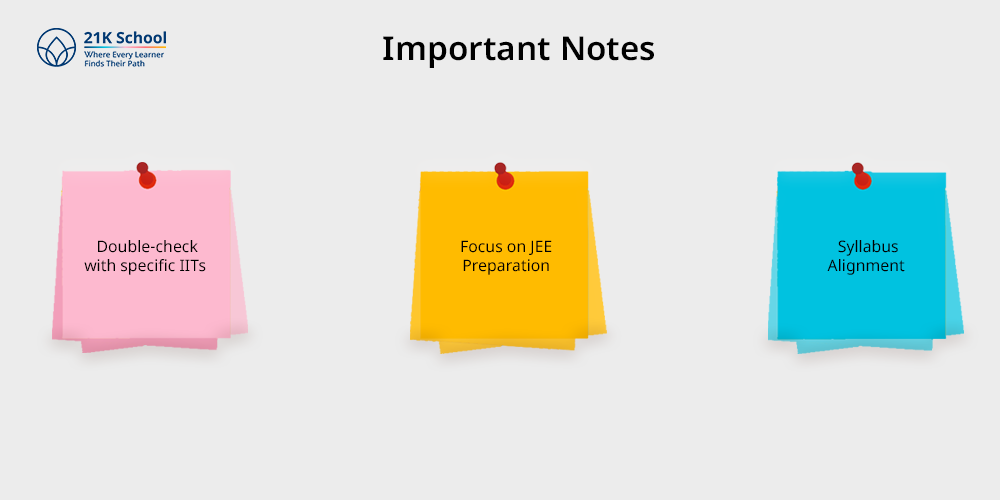
Candidates appearing for the JEE examination must follow all the guidelines and procedures for the smooth conduct of the examination.
Before applying for the examination, students must ensure all the essential requirements and the documentation process to avoid a last-minute rush. Here you can find some important notes regarding the examination.
1. Double-check with specific IITs
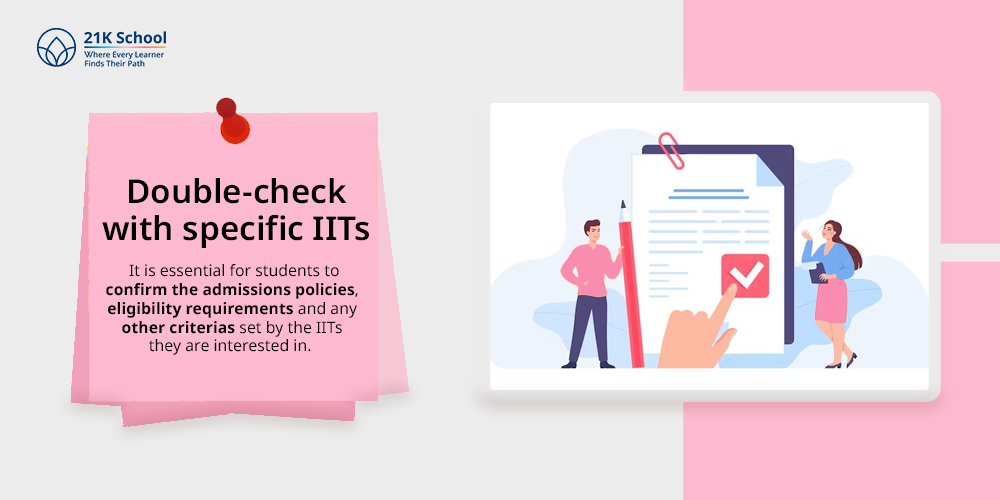
Each Indian Institute of Technology (IIT) may have unique admissions procedures, rules and requirements. It is essential for students to confirm the admissions policies, eligibility requirements and any other criterias set by the IITs they are interested in.
This may include the exam format, cut-off scores and any prerequisites for particular subjects. Students can find all the important information of IITs through the official website at
2. Focus on JEE Preparation
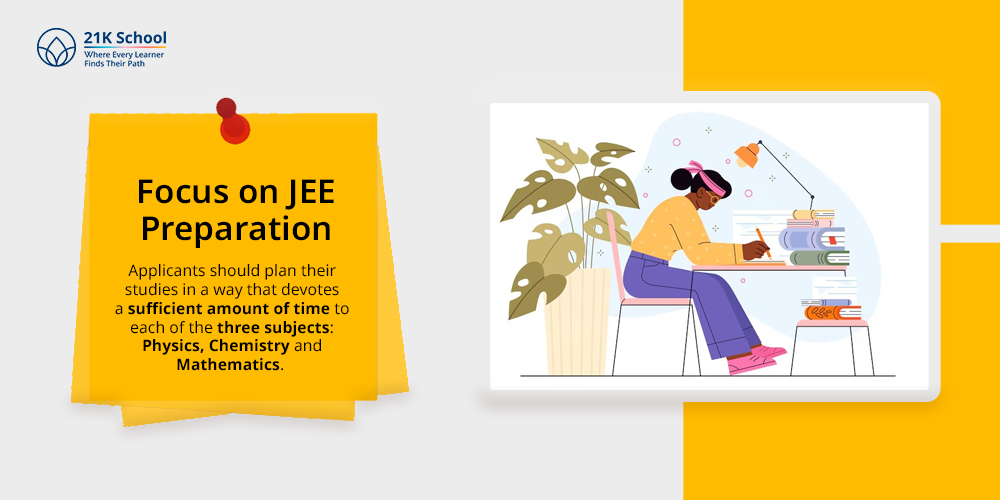
Applicants should plan their studies in a way that devotes a sufficient amount of time to each of the three subjects: Physics, Chemistry and Mathematics.
It is crucial to routinely practice with past years’ question papers and sample papers in order to become familiar with the exam format and improve time management skills .
In order to determine their study routine , candidates should also evaluate their strengths and weaknesses in each subject.
3. Syllabus Alignment
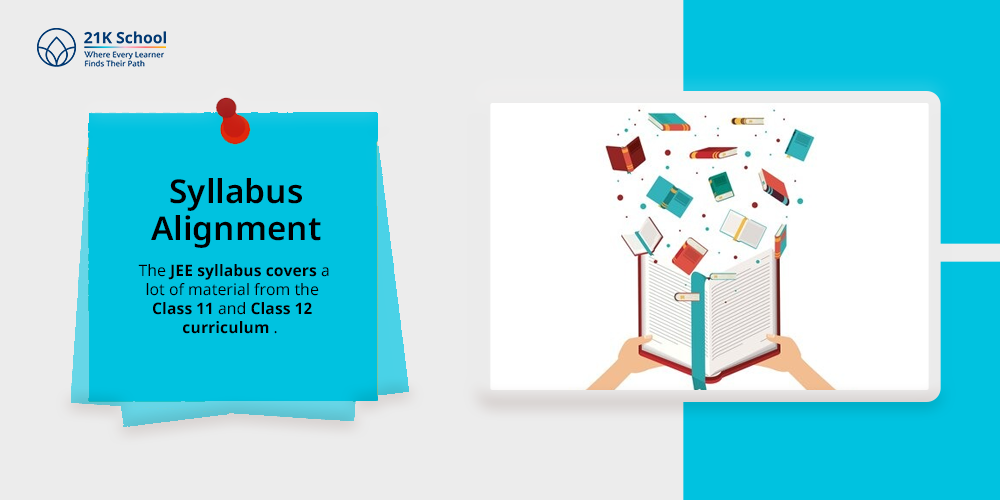
The JEE syllabus covers a lot of material from the Class 11 and Class 12 curriculum . Candidates must ensure that their preparation aligns with the NCERT curriculum, as this is the basis for the official JEE syllabus.
Examining the syllabus thoroughly and prioritising the important topics for the test is essential. Focusing on important concepts, understanding underlying ideas and developing problem-solving techniques are necessary for understanding the syllabus .
Examples of Students who have Succeeded from NIOS
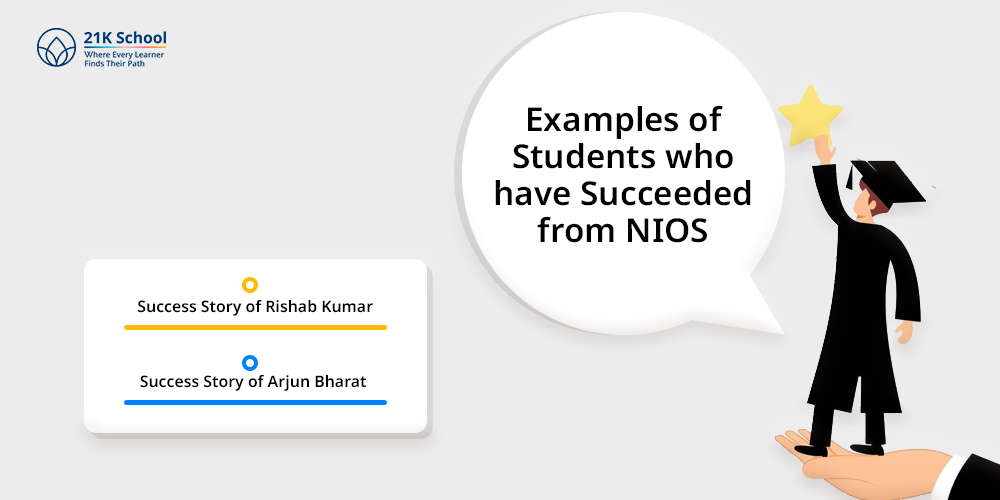
Many students from NIOS board have achieved their seats in IIT, and have achieved their future dreams.
These success stories motivate other students and enhance their confidence. As NIOS education is not just a learning board but an opportunity for students to thrive in a dynamic world.
1. Success Story of Rishab Kumar
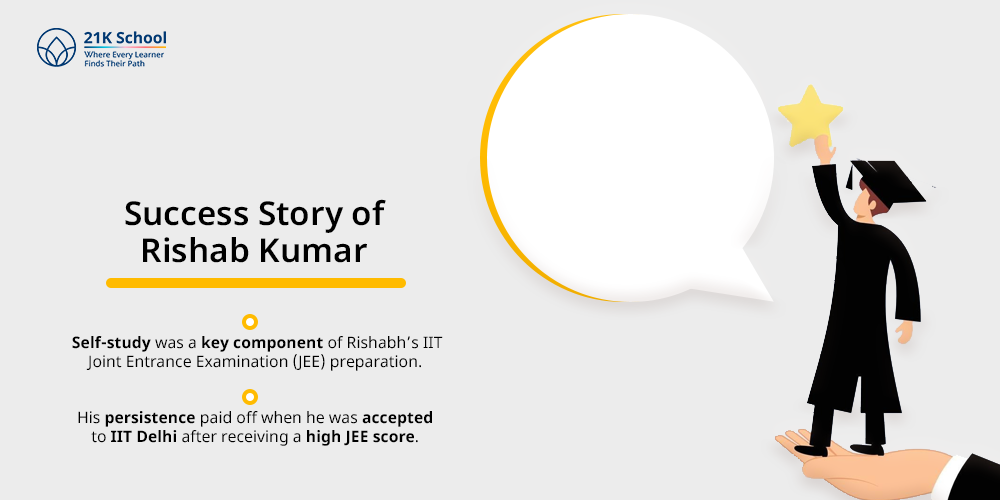
Rishab Kumar was a student of NIOS, who found that traditional education is hectic and does not provide any flexibility. Self-study was a key component of Rishabh’s IIT Joint Entrance Examination (JEE) preparation.
His persistence paid off when he was accepted to IIT Delhi after receiving a high JEE score.
To succeed academically Rishabh’s journey emphasizes the value of perseverance, efficient self-study techniques and making use of the resources at hand, including online lectures and study guides.
2. Success Story of Arjun Bharat
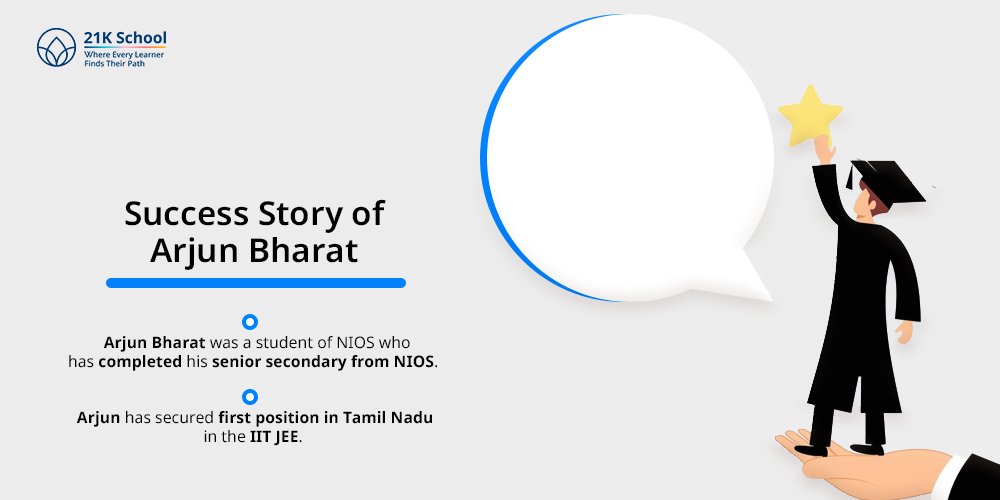
Arjun Bharat was a student of NIOS who has completed his senior secondary from NIOS. Arjun has secured first position in Tamil Nadu in the IIT JEE.
He talked about how he chose NIOS primarily because he was impressed by the flexibility of being able to prepare for both board and competitive examinations at the same time.
He was pursuing his studies in Class XI and XII at a training centre called Smart Training Academy.
Eligibility Criteria of JEE Advanced with NIOS
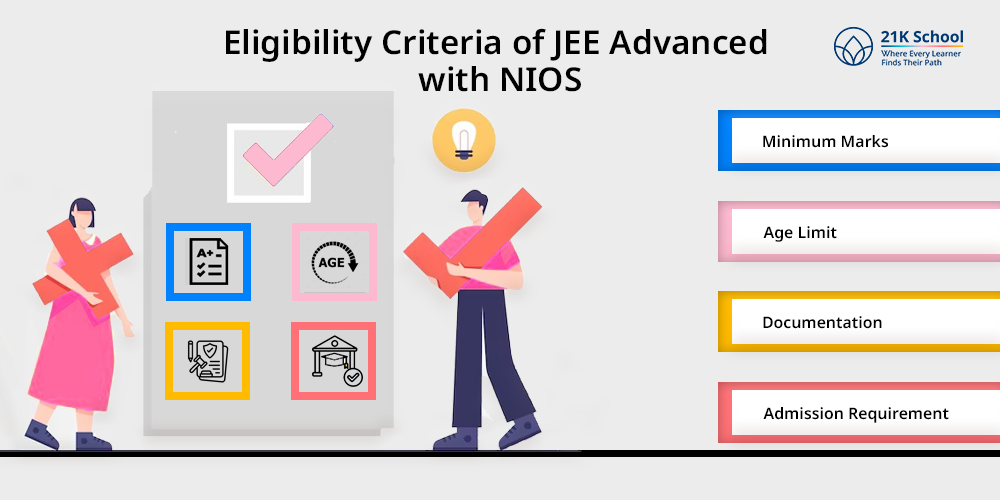
Candidates applying for JEE Advanced through the NIOS board must follow some eligibility criteria. Students applying for the JEE/JEE Advanced must meet the eligibility criteria for a smooth process of exam conduction.
NIOS is an open board and recognized by the government which makes it eligible for every competitive exam. The following are the eligibility criteria of JEE Advanced.
1. Minimum Marks
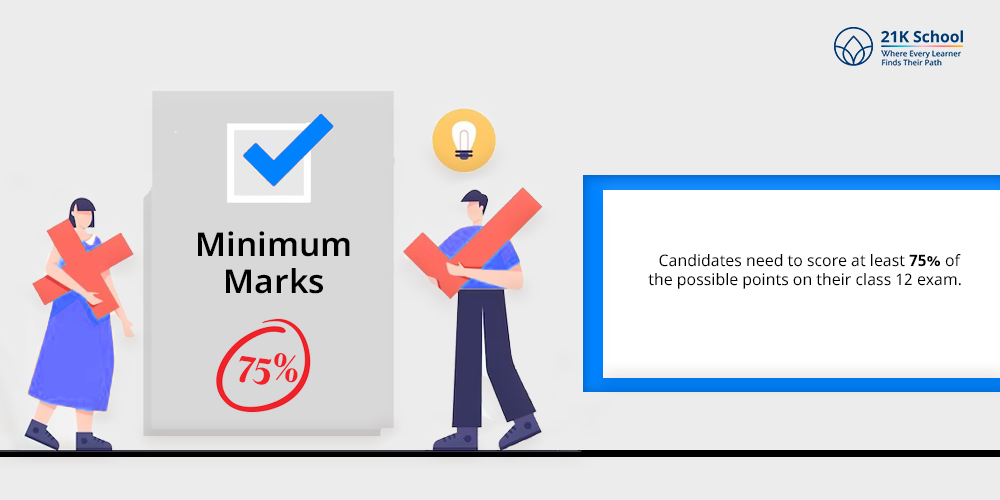
Students applying for the JEE/JEE Advanced must receive a minimum score for a secondary certificate or its equivalent in order to become eligible.
Usually, candidates need to score at least 75% of the possible points on their class 12 exam. Additionally, they must rank in the top 20% of applicants who were accepted into their respective boards.
2. Age Limit
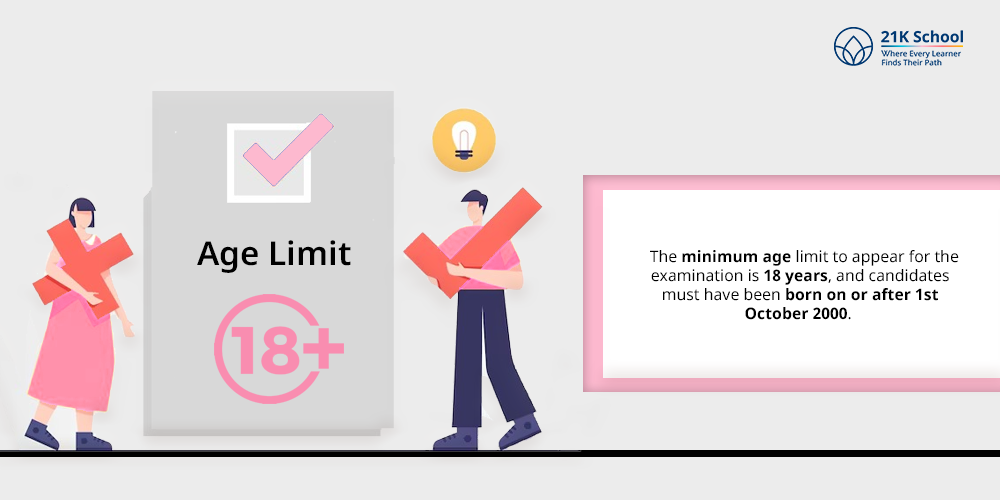
Students who are applying for the JEE exam must ensure the age requirements set by the exam authorities. The minimum age limit to appear for the examination is 18 years, and candidates must have been born on or after 1st October 2000.
Nonetheless, candidates who fall under the reserved categories, such as SC/ST, OBC, EWS or PwD are eligible for a five-year age relaxation. Candidates who meet these criteria are eligible to apply for the JEE examination.
3. Documentation
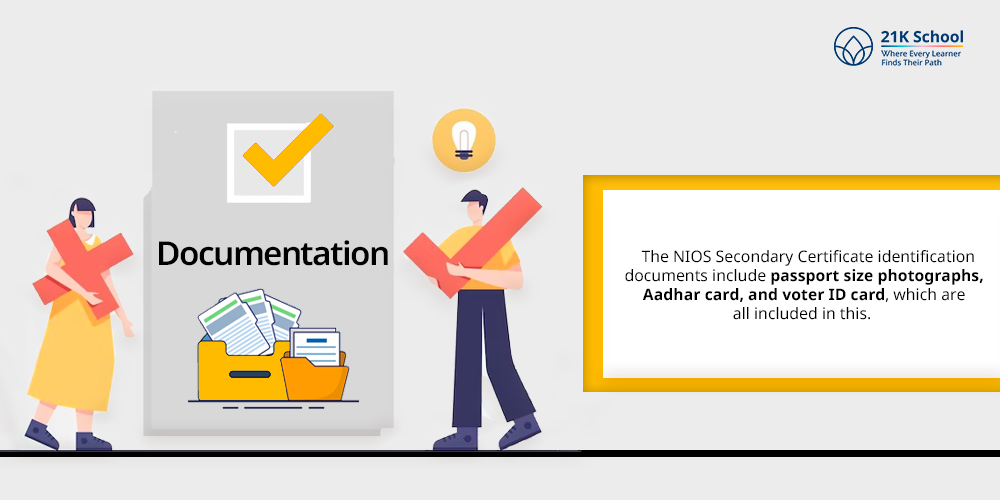
During the application process and upon admission, candidates are required to submit certain documentation.
The NIOS Secondary Certificate identification documents include passport size photographs, Aadhar card, and voter ID card, which are all included in this.
Candidates must also provide a PwD certificate if applicable in order to receive any special treatment. Eligibility, verification and a seamless admissions process depend on proper documentation.
4. Admission Requirement
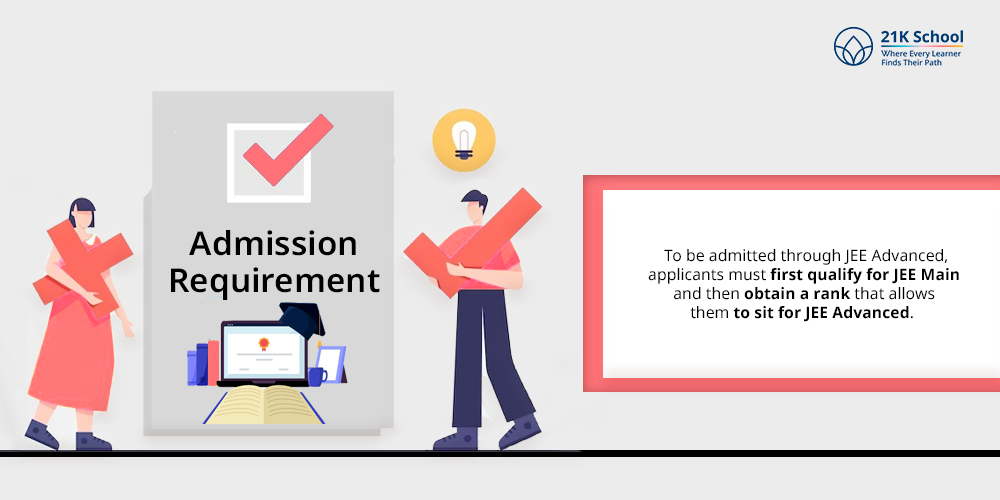
To be admitted through JEE Advanced, applicants must first qualify for JEE Main and then obtain a rank that allows them to sit for JEE Advanced.
The Joint Seat Allocation Authority (JoSAA) counselling process is required of qualified candidates who can select the engineering programs and institutions that best fit their ranks.
Subject Requirements for JEE Advanced with NIOS Board
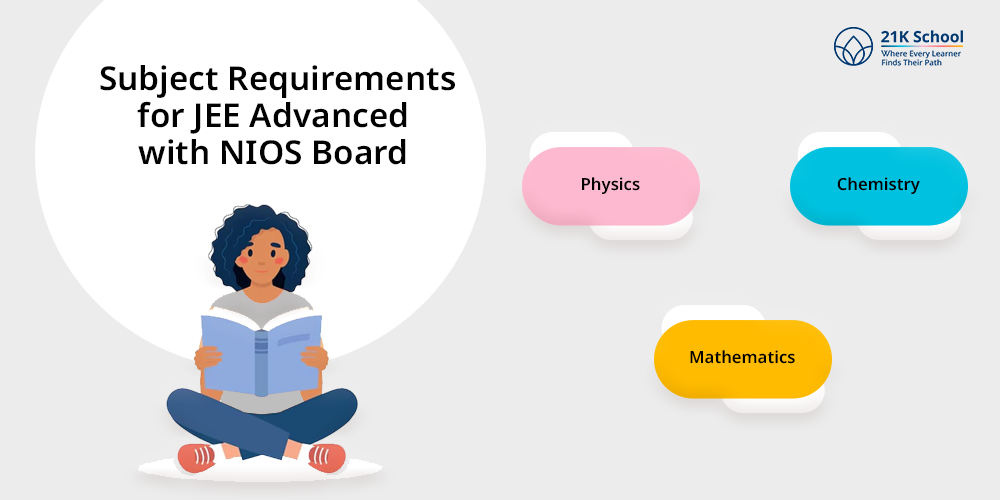
To become eligible for JEE Advanced through the NIOS board, candidates must have three subjects as compulsory subjects.
Students must have Physics, Chemistry, and Mathematics (PCM), while applying for JEE Advanced. Students who don’t have PCM in their secondary education are not eligible to apply for NIOS.
1. Physics
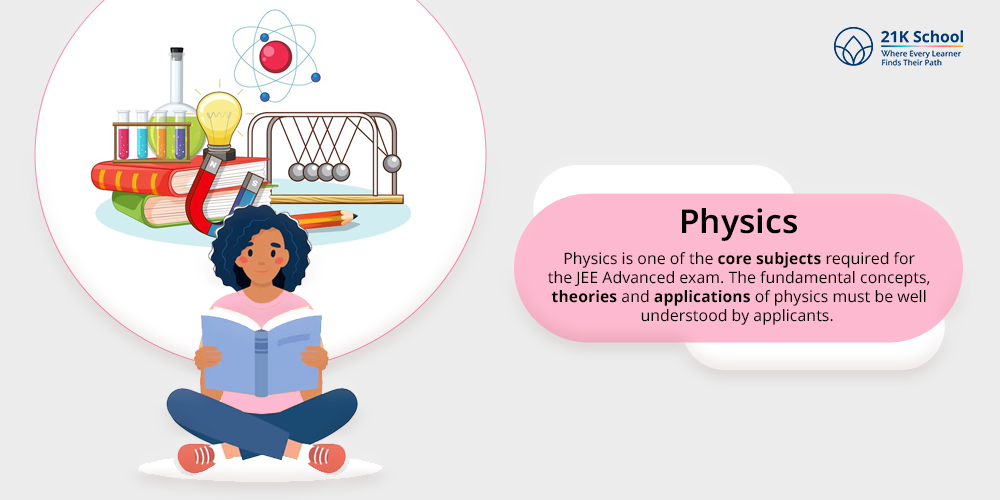
Physics is one of the core subjects required for the JEE Advanced exam. The fundamental concepts, theories and applications of physics must be well understood by applicants.
Topics like modern physics, electromagnetism, optics, thermodynamics and mechanics are typically covered in the syllabus.
Since many engineering courses are based on physics, having a solid understanding of the subject is essential for resolving exam problems.
2. Chemistry
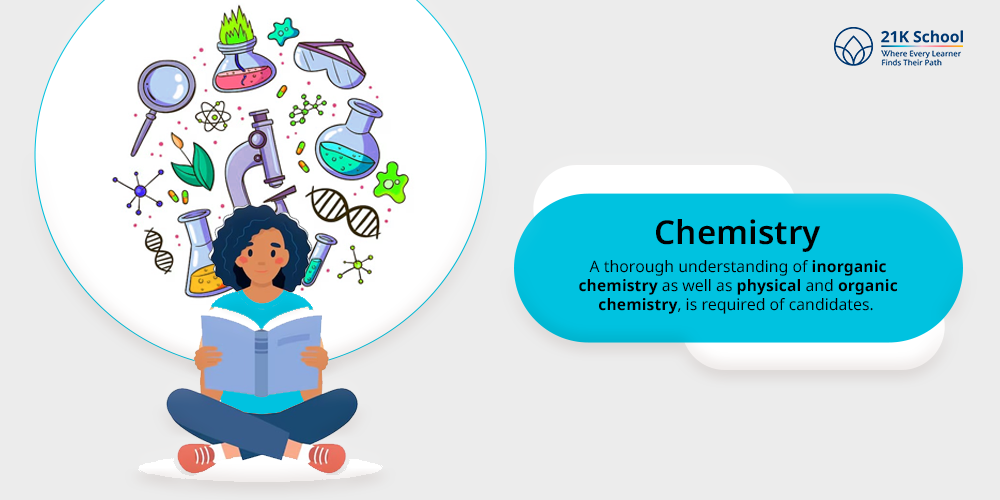
Chemistry is another essential subject for JEE Advanced. A thorough understanding of inorganic chemistry as well as physical and organic chemistry, is required of candidates.
Topics including equilibrium, thermodynamics, chemical bonding, atomic structure and reaction mechanisms are all covered in the syllabus.
For professions like chemical engineering, materials science, and environmental engineering, a solid grasp of chemistry is essential.
3. Mathematics
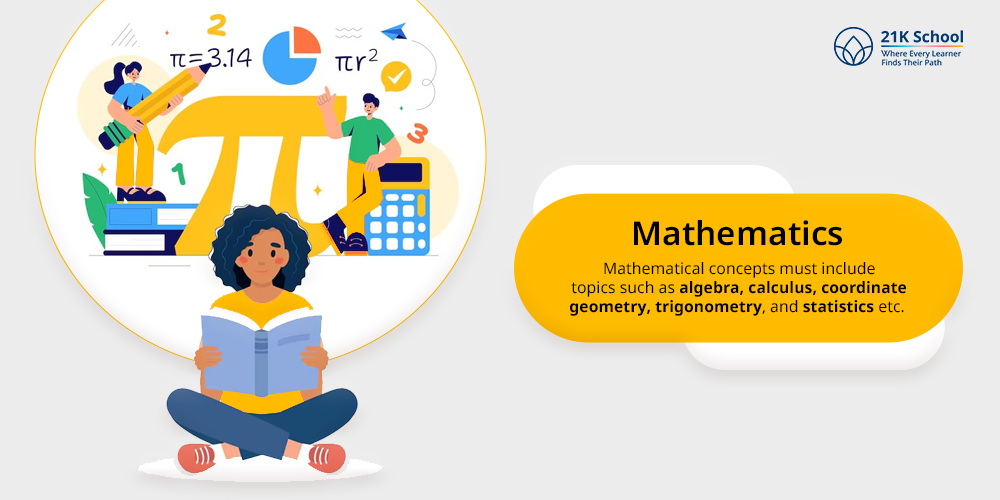
Mathematics is a crucial subject for the JEE examination. Mathematical concepts must include topics such as algebra, calculus, coordinate geometry, trigonometry, and statistics etc.
Since mathematics is widely used in modelling, analysis and problem-solving across numerous engineering disciplines, it is essential to engineering.
Tips for NIOS Students Appearing for JEE
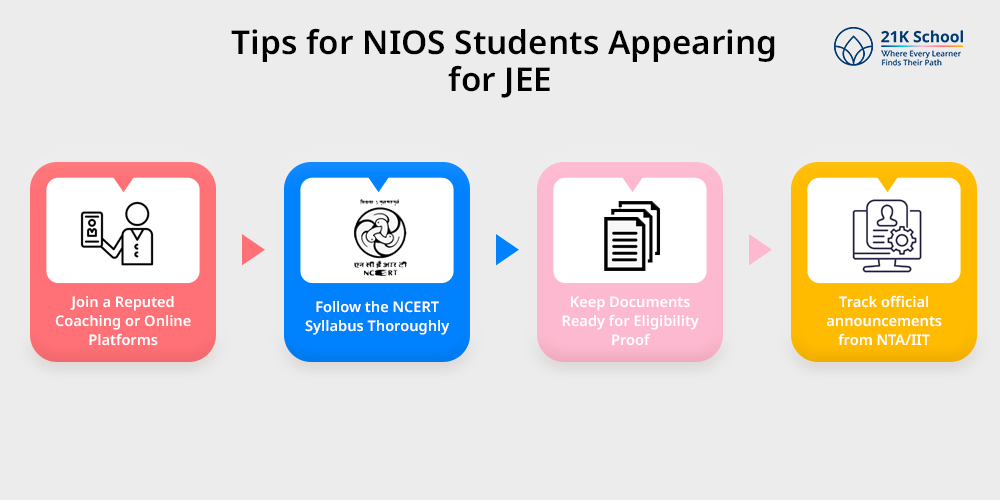
Students who have passed out through the NIOS board and want to appear for the JEE examination need to follow some guidelines and procedures.
NIOS is an open board in India that is approved by all the Indian Institutes and educational platforms, which makes the enrollment process smoother and simpler.
Here are the top NIOS students who should follow before appearing for the JEE/JEE Advanced.
1. Join a Reputed Coaching or Online Platforms
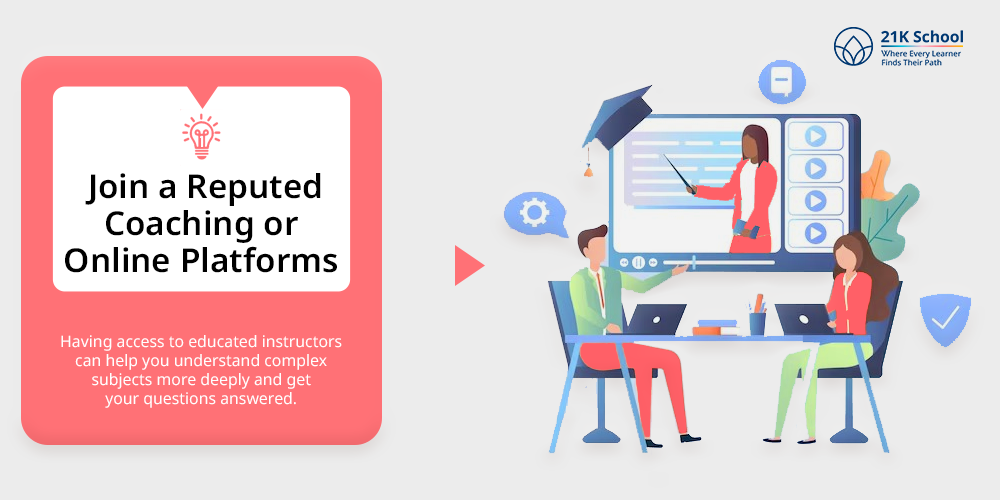
Enrol in a reputable coaching centre or online learning environment to benefit from structured instruction and informed guidance.
Having access to educated instructors can help you understand complex subjects more deeply and get your questions answered. To determine your level of preparation and identify areas that require improvement, regularly take part in practice exams.
2. Follow the NCERT Syllabus Thoroughly
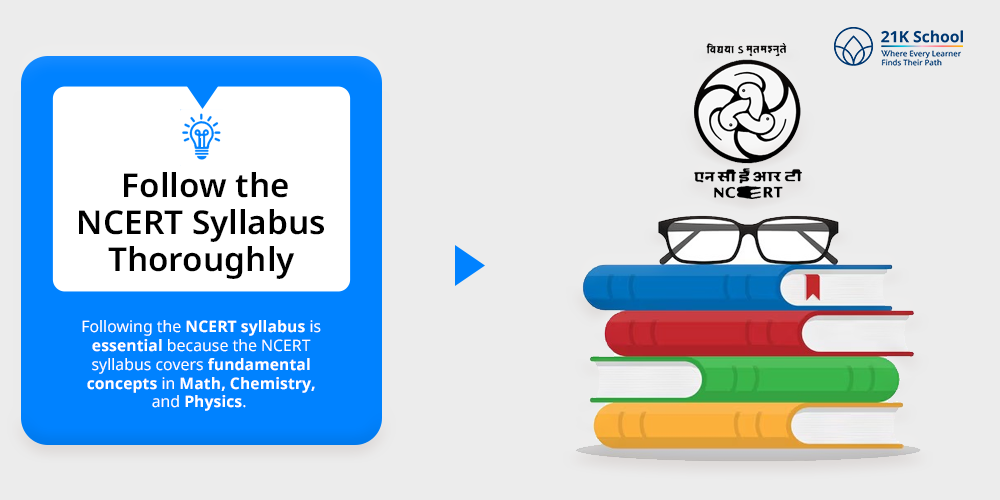
Following the NCERT syllabus is essential because the NCERT syllabus covers fundamental concepts in Math, Chemistry, and Physics.
The greatest option for concise explanations and compatibility with the JEE exam format is an NCERT textbook. To enhance your comprehension and hone your problem-solving abilities, practice NCERT problems.
3. Keep Documents Ready for Eligibility Proof
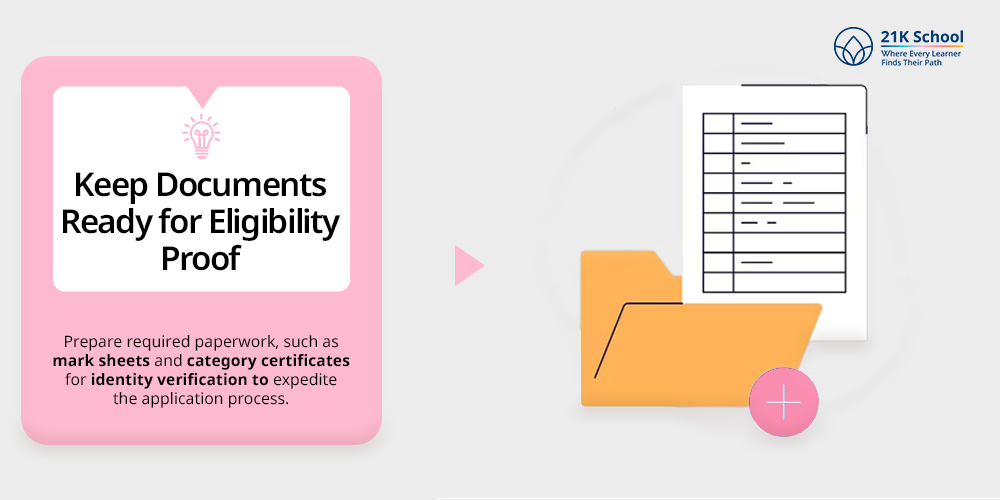
It is necessary for students to keep the documents ready for eligibility proof. Make sure you meet the JEE authorities’ age, educational and other eligibility requirements.
Prepare required paperwork, such as mark sheets and category certificates for identity verification to expedite the application process. Keeping your paperwork organised will help you avoid last-minute stress during the application process.
4. Track official announcements from NTA/IIT
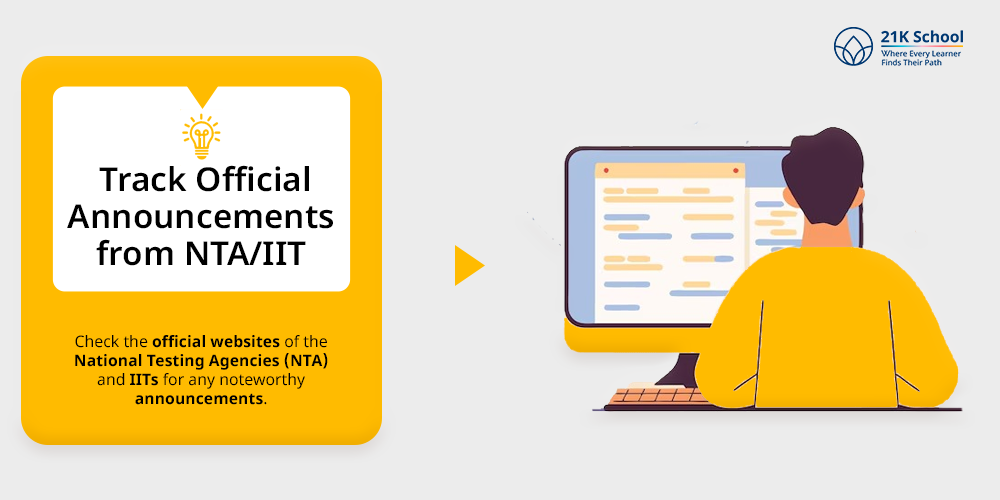
Check the official websites of the National Testing Agencies (NTA) and IITs for any noteworthy announcements. To make sure you’re ready, stay informed about exam dates, syllabus changes and application procedures.
A realistic preparation schedule based on official updates should be created to ensure that each subject and topic has adequate time.
Conclusion
Given that the NIOS board is a government-approved educational establishment, NIOS students are in fact qualified to take the JEE exam.
This creates chances for students enrolled in engineering programs at esteemed universities such as IITs and NITs.
Candidates must fulfil certain eligibility requirements, such as graduating from senior secondary school with the necessary grades and subjects in order to be eligible.
They should also understand the significance of matching their preparation with the JEE syllabus and the documentation required.
With the correct preparation, commitment, and tools NIOS students can succeed on the JEE and fulfil their academic and professional goals in engineering.
